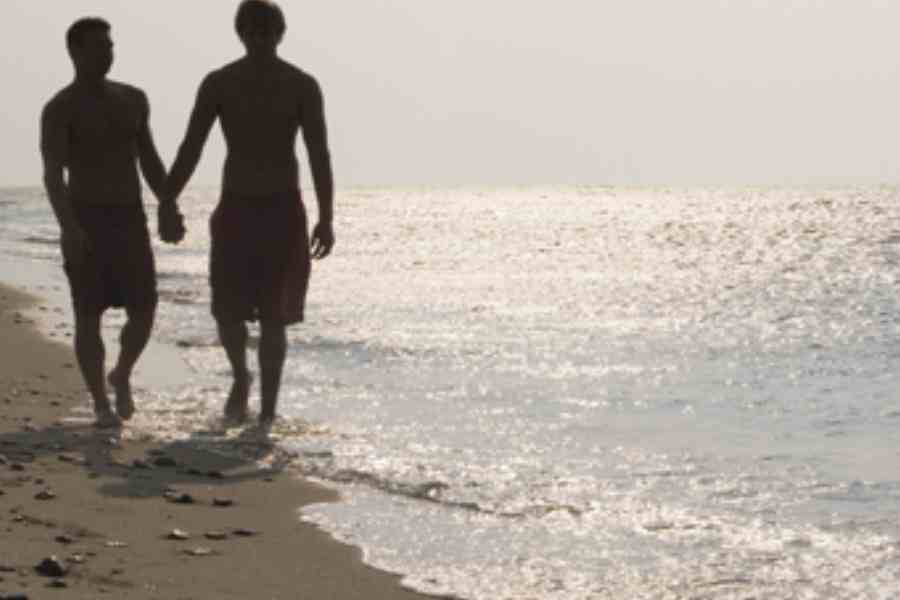Members of India’s gay community continue to face beatings, sexual assault and murder threats even though the Supreme Court decriminalised homosexuality six years ago, population researchers have said in a study that sampled six metros, including Calcutta.
Their study has found pervasive violence against men who have sex with men (MSM) with six in 10 men sampled, on average, having faced some form of violence for their sexual orientation. Men aged between 18 and 24 are at the greatest risk, 81 per cent among them having faced some violence.
“Our results provide new quantitative evidence to show that legal safeguards are not sufficient to protect MSM from individual or societal prejudices,” said Niharika Tripathi, an assistant professor of sociology at the Indraprastha College in New Delhi who led the study.
“They suggest that many continue to suffer a lot, often in silence,” she told TheTelegraph.
Tripathi and her colleagues from three other academic institutions surveyed 50 MSM people each from Ahmedabad, Bengaluru, Calcutta, Delhi, Lucknow and Mumbai to look for patterns of violence, protective factors, as well as differences across the cities.
Their sample of 300 — albeit small — has revealed that MSM people aged 18 to 24, those open about their sexual orientation, those with low family incomes and those who do not have the support of their families are at the highest risk of violence.
The prevalence of different forms of violence varied sharply across the cities.
The results suggest that MSM people in Calcutta are at the highest risk of some form of violence, with 40 (80 per cent) of the 50 having faced verbal, physical or sexual violence. Ahmedabad had the lowest rate (50 per cent), implying that one in two MSM people faced some form of violence even there.
Those sampled in Calcutta reported the highest rates of verbal (72 per cent) and physical (46 per cent) violence, while Delhi MSM people reported the highest rates of sexual violence (44 per cent).
For their study, the researchers defined verbal violence as a murder threat specifically linked to sexual orientation, disregarding other possible verbal abuses. Across the six cities, on average, 56 per cent of the MSM people had encountered a murder threat.
A 38-year-old painter in Bengaluru narrated to the researchers how his paternal uncle had threatened his life. “His response was harsh, he even went so far as to declare in front of everyone that if I were his son, he would have killed me…. We haven’t spoken since,” the painter recalled.
The study participants' testimonies suggest that sexual violence against MSM people often occurs within intimate or familial settings, fuelled by power differentials or coercion, the researchers said in the study, published in the journal BMC Public Health.
The study has cited accounts of physical assaults experienced by a 22-year-old cook in Ahmedabad and a 26-year-old professional dancer in Mumbai, as well as sexual assaults experienced by a 24-year-old hairdresser in Delhi and a 26-year-old beautician in Calcutta.
Tripathi and her colleagues have speculated that the portrayal of gay individuals in the media as effeminate men who provide comic relief has gained traction in recent years.
This trend may have reinforced negative stereotypes, thereby normalising verbal ridicule and possibly contributing to the escalation of verbal and physical violence against younger MSM people, they wrote in their study.
The study's other co-authors are Suraj Pal at the University of Delhi, Praveen Kumar Pathak at the Jawaharlal Nehru University, New Delhi, and Margubur Rahaman at the International Institute of Population Sciences, Mumbai.
"Societal acceptance is a great distance away," said Sanjeevani, who works with a non-government organisation campaigning for the rights of LGBTQ (lesbian, gay, bisexual, transgender, queer) individuals. "Various forms of violence often remain unreported for different reasons, including because of the fear that going to police might draw the family into the case."
Transgender persons, Sanjeevani said, who have sought treatment in government hospitals at times have encountered doctors who appear to not want to maintain a physical distance from them. "They don't examine, they prescribe medicines from a distance. Isn't that a form of violence too?"
The Centre had earlier this year set up a panel of administrators to make recommendations to ensure that LGBTQ persons do not face any threat of coercion, harassment, violence, or discrimination in access to goods, services, or social welfare entitlements.










